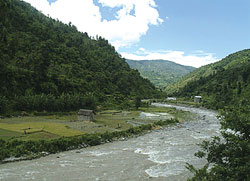 Last week there was a showdown on the future of Melamchi between the CPN-M and the Asian Development Bank (ADB). Yet another setback to a large scale infrastructure project. The Beed can't really figure out where the government stands. While Hisila Yami demonstrated her position very clearly, she still does not have any solutions. So we can just expect more of the same for the next six months.
Last week there was a showdown on the future of Melamchi between the CPN-M and the Asian Development Bank (ADB). Yet another setback to a large scale infrastructure project. The Beed can't really figure out where the government stands. While Hisila Yami demonstrated her position very clearly, she still does not have any solutions. So we can just expect more of the same for the next six months.
Melamchi has been a bone of contention for many years. The NGOs that helped end Arun III nearly 15 years ago have managed to now stall Melamchi helped by a populist wannabe minister.
There's a lot of self-righteous talk against the private sector getting involved in hydropower. Globe-trotting activists against the private sector development of hydropower earn hefty consulting dollars. But what do they have to say when we have 12-hour power cuts everyday? What do the anti-Melamchi types have to say about what we'll drink in the Valley?
Self-styled economists go blue in the face debating about whether water should be developed by the public or private sector. The Beed thinks that if you can sell water in bottles and in tankers and, as a government agency charge for water, it is probably a commodity that needs to operate in a regulated environment.
Look at the price we pay anyway. There are overhead tanks in every house and storage facilities. We consume millions of units of power pumping water into underground and overhead tanks. We have to wake up in the wee hours of the morning to check on the water, spend hours queuing at local stone spouts, and wait further countless hours for tankers to arrive. And this is only about quantity. There are equally dire problems with quality, water -borne diseases being a major health hazard.
On Melamchi, after World Bank withdrew from the process, it was for the ADB to take it up. The Beed is not sure whether these multilaterals have been terribly successful in implementing water projects of this magnitude successfully anywhere in the world. Further, the involvement of more than one donor just delays the process, as the priorities of the different agencies are, apart from imposing donor-country equipment and services, diverse and sometimes completely divergent.
So here's a solution: If we agree that Nepali people need to pay a commercial price for water, then let us have the private companies bid for these projects, based on public-private partnerships (PPP). Let us create a regulatory environment where the private provider is penalised for not delivering quality or quantity. Let us not foster an environment where they can get away with providing less than they promise.
The electricity business should be looked at as having three distinct parts. First is the source of supply, like electricity generation that could be from the private sector on a build, operate, and transfer model. The pipe network, like the transmission towers, is owned by another PPP company that for a certain charge allows the suppliers to sell to the distribution companies. Finally, distribution PPPs could be formed with VDCs and municipalities to ensure better service to the end consumer. This could perhaps provide sustainable solutions in the long run for all scales of water projects.



